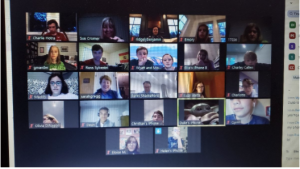By Helen Hayden
In these extraordinary times we are living through, it has been necessary for many people to radically change the way they work – including the Justice and Peace Commission. Many of us experienced the Easter services live streamed from St Anne’s Cathedral, through the internet, into our living rooms. It has been impressive how quickly people and institutions have adapted to the restrictions. This has meant a rapid assessment of etiquette in these new and strange situations but many of us are appreciating being able to see friends and family on video calls, enjoying quizzes and virtual birthday parties! Live streaming of Mass will never replace physically being with other people in church and being able to receive the Blessed Sacrament however I am very appreciative of being able to engage in the Mass in this virtual way.  At J&P we quickly signed up to Zoom and have been conducting virtual meetings and it is good to see people even if we sometimes get interrupted by little ones! Joe Burns and I joined a Zoom conference
At J&P we quickly signed up to Zoom and have been conducting virtual meetings and it is good to see people even if we sometimes get interrupted by little ones! Joe Burns and I joined a Zoom conference
hosted by Citizens UK with over 250 other people. It worked incredibly well, and the subject was virtual and online campaigning. The conference’s main input was from Nona Jones who as well as being a Pastor of their Church community in Florida advises Facebook on Faith Communities. She introduced us to the excellent resource hub www.facebook.com/community/faith. Nona likened a Facebook presence to a home. The Facebook page is the ‘front porch’ which is viewed passively by people passing by and then you can invite people in by setting up a Facebook group in which people can engage and participate in discussions. This is a safer area as it can be controlled by the host and is much more interactive and targeted. We already have a ‘front porch’ so perhaps it is time to be developing Facebook groups where people can safely share their thoughts about particular issues.
There are issues in this brave new world, we have received warnings about ‘Zoombombing’ where people are able to join meetings to which they haven’t been invited. There have been reports of people having their accounts hacked through ‘Houseparty’ another online video chat website. The biggest and most important issue is of people not being able to access the internet either due to financial reasons, lack of experience or both. As I marvelled at the number of people watching the live feed from St Ann’s on Good Friday, I couldn’t help wonder how many people would have attended services around the diocese who could not watch on You tube. Although technology is enabling us to stay in touch, share information and stay safe in these times of crisis, there is a danger of the very people we are most concerned about, being left on the margins of our virtual communities.
When we evaluate the outcomes of this crisis, we may decide that we want to carry on some of the practices we have developed to carry on during the lockdown. There are benefits, environmentally and community wise. Zoom could be a great way to involve a much wider cross-section of the diocesan community – people for whom attending a meeting in Leeds, for example, would simply be too difficult -especially in the evening.
However, we must be careful not to leave out the very people we need to include and protect.
